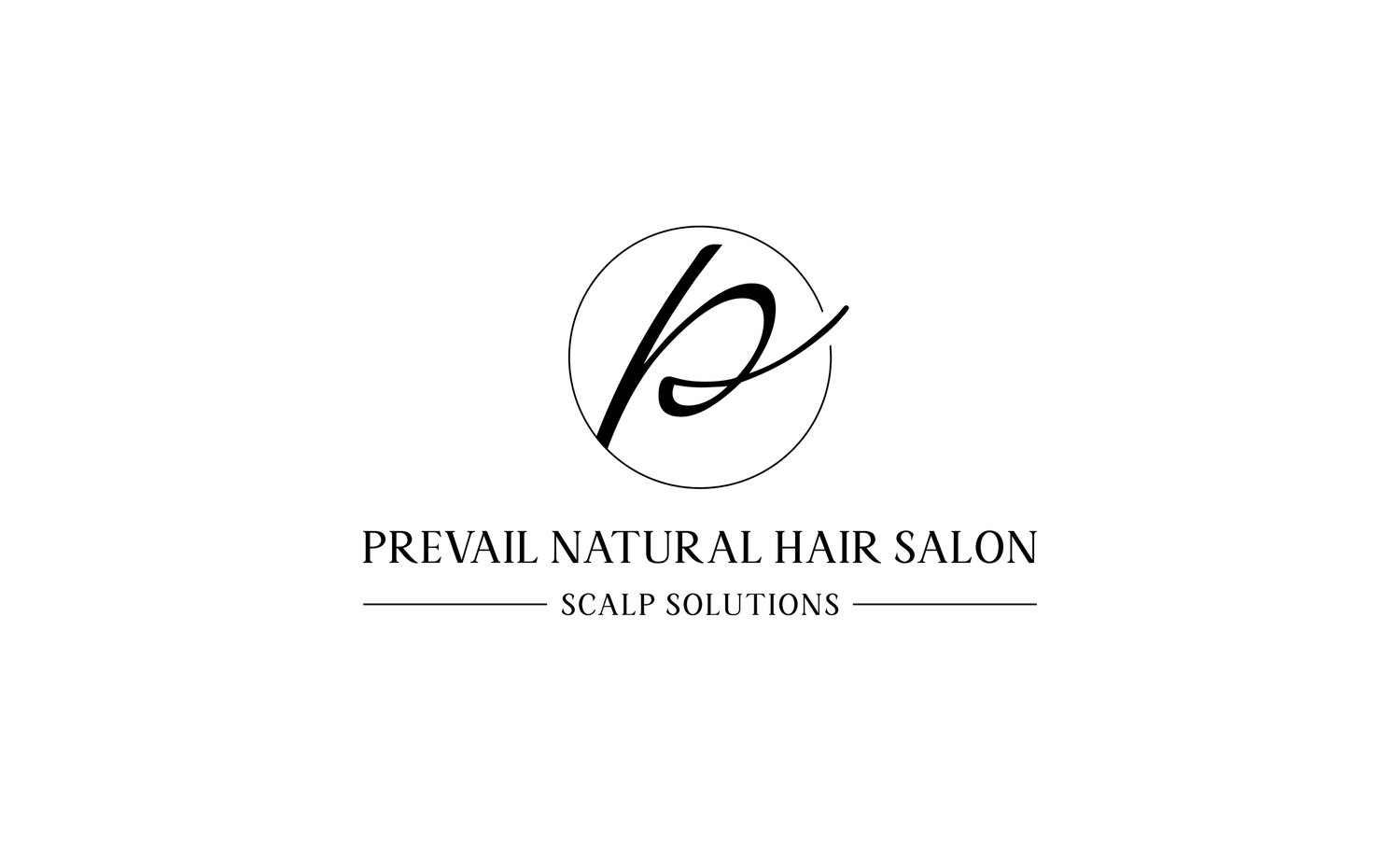How healthy is your hair?
Maintaining healthy natural hair is a journey that requires more than just products and routines; it demands patience and unwavering commitment. These two elements are the bedrock of a successful natural hair care regimen. Without them, the path to vibrant, healthy hair can become a challenging one.
Addressing Hair Loss with Pre'Vail
Hair loss isn't just a physical issue; it can deeply affect self-image, causing low self-esteem, anxiety, and social withdrawal. When hair loss begins, it can feel like a loss of identity. Hair plays a significant role in how we present ourselves to the world, and losing it can be emotionally challenging.
At Pre'Vail, we understand the impact of hair loss, and we're here to help you get to the root cause. We offer various solutions to empower you:
Wigs and Hairpieces: For those who want to maintain their usual appearance, wigs and hairpieces are a natural-looking, confidence-boosting option.
Embracing Baldness: Some individuals choose to embrace their baldness or thinning hair, finding empowerment in their unique style.
Medical Treatments: Medical interventions, including medications and treatments, can effectively slow or reverse hair loss, particularly in cases related to genetics or medical conditions.
No matter how you decide to approach hair loss, remember that your worth extends far beyond your appearance. Pre'Vail is here to provide options and support, helping you navigate this challenging journey with confidence and assurance.
Scalp Solutions
Hair loss is a common issue that impacts individuals across the globe. There's a multitude of causes, types, and treatments for hair loss, and having a fundamental understanding is crucial for making informed decisions regarding your hair's well-being. Here are some essential points to be aware of:
Early Intervention: Addressing hair loss concerns promptly can often yield more successful results. If you notice unusual hair shedding or thinning, it's advisable to consult with a healthcare professional or dermatologist.
Nutrition and Lifestyle: Maintaining a balanced diet rich in essential nutrients, along with a healthy lifestyle, can positively impact hair health. Certain vitamins and minerals, like vitamin D3, zinc, and iron, are particularly important for hair growth.
Scalp Health: The health of your scalp is crucial for hair growth. Conditions like dandruff or dermatitis can impact the hair follicles. Proper scalp care can promote a healthier environment for hair growth.
Hair Care Practices: The way you treat your hair, from washing and styling to protective hairstyles, can influence its health. Gentle hair care practices and avoiding excessive heat or tension can help prevent damage.
Stress Management: High levels of stress can contribute to hair loss. Implementing stress management techniques like meditation, exercise, or therapy can help reduce this impact.
Individualized Care: What works for one person may not work for another when it comes to hair loss. Personalized treatment plans are often more effective and should be crafted with the help of a healthcare professional.
Understanding Hair Loss
-

CAUSES
Genetics: Hereditary hair loss, or androgenetic alopecia, is the most common cause of hair loss in both men and women.
- Hormonal changes: Hormones such as DHT, thyroid hormones, and estrogen can affect hair growth.
- Medical conditions: Certain illnesses, medications, and treatments.
- Nutritional deficiencies: Poor nutrition can lead to hair loss, especially deficiencies in iron, zinc, and biotin.
- Stress: Emotional stress or physical stress (e.g. surgery, illness) can cause a temporary hair loss condition called telogen effluvium.
- Hairstyles and treatments: Certain hairstyles and hair treatments, such as tight braids, weaves, and chemical relaxers, can damage hair and lead to hair loss.
-

TYPES
- Androgenetic alopecia: This is the most common type of hair loss, characterized by a receding hairline and thinning on the crown of the head.
- Telogen effluvium: A temporary hair loss condition caused by stress, illness, or medication that affects the hair growth cycle.
- Alopecia areata: An autoimmune condition that causes hair loss in patches on the scalp, face, and other areas of the body.
- Traction alopecia: Hair loss caused by pulling on the hair, often caused by tight hairstyles such as braids and weaves.
To name a few!
-

TREATMENTS
- Medications: Finasteride and minoxidil are FDA-approved medications for treating androgenetic alopecia.
- Hair restoration surgery: Hair transplant surgery involves taking hair from one area of the scalp and transplanting it to another area.
- Low-level laser therapy: This is a non-invasive treatment that uses lasers to stimulate hair growth.
- Topical treatments: Certain topical treatments such as shampoo and topical corticosteroids may help with hair loss caused by certain medical conditions.
- Lifestyle changes: Eating a healthy diet, reducing stress, and avoiding damaging hairstyles and treatments can all help promote healthy hair growth.
Practices for Maintaining Healthy Hair:
Balanced Diet: Ensure that your diet includes foods rich in vitamins, minerals, and proteins to support healthy hair growth.
Hydration: Staying well-hydrated is essential for proper toxin elimination and overall hair health.
Stress Management: Chronic stress can contribute to hair problems, such as loss and breakage. Employ strategies to reduce and manage stress.
Gentle Hair Products: Opt for hair products free of harsh chemicals like sulfates and parabens, as these can damage your hair over time.
Sun Protection: Shield your hair from the sun's harmful UV rays by wearing a hat or scarf, especially in sunny conditions.
Gentle Hair Care: Brush your hair gently using the appropriate brush type to prevent breakage and damage. Avoid aggressive brushing.
Scalp Care: Maintain a clean scalp by regularly washing your hair. This practice helps eliminate dirt, excess oil, and debris that can clog hair follicles and potentially lead to hair loss.
Certain dietary choices can significantly impact the health and vitality of your hair and scalp. Incorporating specific foods into your diet can provide essential nutrients to promote optimal hair health. By incorporating these nutrient-rich foods into your diet, you can take positive steps toward maintaining healthy hair and a nourished scalp.
Fatty Fish: Salmon, tuna, and sardines are rich in oils that enhance hair and scalp luster and elasticity. They also offer a high protein content, which contributes to shaft strength.
Legumes: Beans serve as an excellent source of iron, zinc, protein, and biotin, all of which are important for healthy hair.
Organic Poultry: Organic poultry is a valuable protein source that can strengthen the hair shaft.
Whole Grains: Whole-grain products such as whole-breads and brown rice are fortified with B vitamins, biotin, and zinc, which support hair health.
Dairy and Dairy Alternatives: Almond milk, soy milk, and yogurt are rich in calcium and protein, which contribute to hair health.
Leafy Greens: Kale and collards provide an abundance of iodine, promoting an active thyroid, which is essential for overall hair health.
Green Vegetables: Broccoli and spinach play a role in the production of natural scalp oil and contribute to slowing down the aging of the skin.
Texture Tips: Elevate Your Hair Game!






